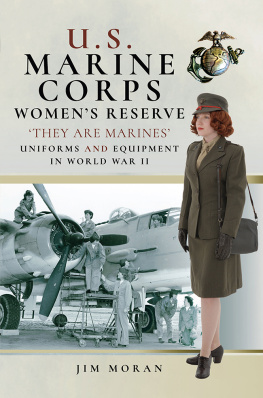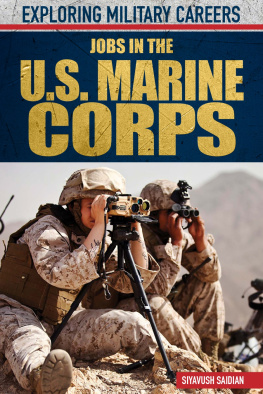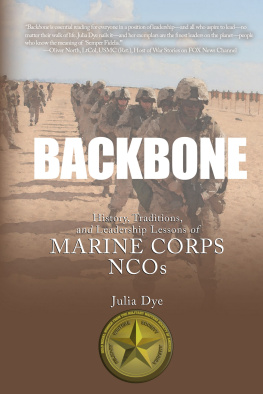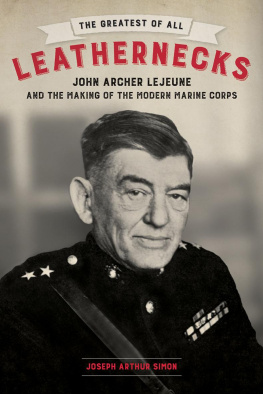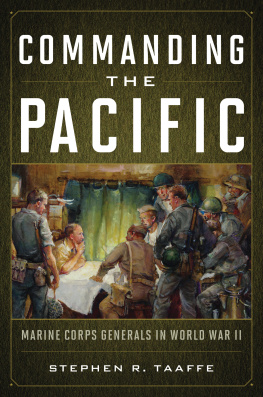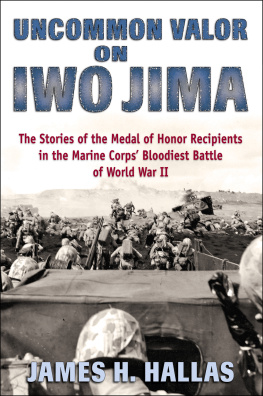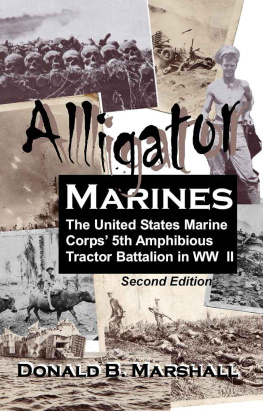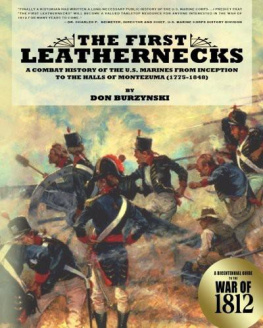Foreword
This book does not purport to be a history of the United States Marine Corps, which has served in twelve major wars and more than two hundred lesser actions.
It is, instead, the record of certain significant Marine actions which illustrate Marine history as a whole. These incidents and battles do not have significance for Marines alone, but for all Americans.
They are part of our own history, our national story. However, they have largely been forgotten, because Americans have an imperfect sense of our past.
The men in these pages run curiously to type, as that splendid communicator on U.S. Marines, Colonel Thomason wrote. Most of them are professional soldiers; many are of that ubiquitous type without which no standing military body can exist: the professional private.
The gallantry of Marine officers is well-documented. The efficiency of Marine NCOs is indisputable. But still, without the professional private there would be no Marine Corps. He is the man who gets and does the dirty jobs. He is the man who carries them through, without much pay, with little recognition.
He is the Marine who sweats on the rifle range while the drums are silent, and the fires of patriotism not yet lit. He is not the gallant volunteer who rushes into the grandeur and tragedy of war, then, when the war is done, says to hell with it till next time.
He knows, as surely as the sun must rise, there will be a next time, and he prepares for it.
He likes the comradeship of the men around him; he likes the close-knit, parochial community of arms. If war is his occupation, the service is his home. Above all else, the most important thing in his life is the Corps. The Corps gives his life meaning; in return, he gives it his life. And it is a fact that many men, reservists and sometimes Marines, find their service as the defining moment of their lives. Once a Marine, always a Marine.
The men in these pages generally are not imaginative, nor are they sensitive to all the currents around them. Political correctness passed them by. Those who constantly visualize their own blood staining the earth rarely become professional soldiers. Since war is their occupation, most of these men do not much wonder at the tasks they are asked to do. They do not muse over the metaphysical or the meaning of it all, nor does combat come to them as a shock. Their eye on the enemy, until he is proven dead.
When this book was researched most of the Marines depicted in these actions were still living. Most this was a different age and culture for various reasons had no wish to be named. Therefore many names were changed. For example, the man identified as Corporal Cherry Reed in the Okinawa action, was the Honorable Blair Bruzzy Reeves, last Justice of the Texas Court of Appeals. When the book was first printed, he was entering on his political career and asked me to change his name, so that no one might think he was trading on his heroism. Aurtre temps, autre moeurs.
In the Old Corps few men got medals for doing their job unlike today, when a soldier who has never heard a shot fired in anger may sprout rows of ribbons.
The names of officers, company commanders and above, which are recorded in history, have not been changed.
Few of these men are now alive. However, Lieutenant Colonel Ray Davis, now General, USMC-retired, was still erect and hearty when I saw him at the proceedings of the United States Naval Institute where I spoke in March, 1999.
Yet, the breed survives. Old and new, the country and the Corps have always needed this breed of man throughout our past.
We shall need him again.
T.R.F.
June, 1999
Part I
The Old Corps
The story of the first century of the United States Marines is as much composed of legend as of fact. To say this is to do the Corps no disservice, for legend is as important to a fighting organization as ever any fact. Legend, intertwined with solid fact to give it body, lends mystique to what is really a hard, dirty, monotonous trade, having occasional periods of great danger and excitement.
And mystique is as necessary to the men who live that hard, monotonous existence as the bread they eat, and the flag for which they are willing to die. No fighting unit which has made its mark upon the globe has ever been wholly without it.
Men do not live by bread alone, nor do they die willingly for purely rational reasons. Legends give them a code to live by, a standard to measure up to. And when there is a solid measure of truth to legend, each man who becomes a part of that legend may feel a certain pride that he belongs.
In battle however odd this may seem to those who have never thrilled to the notes of Retreat or to the tales, oft recounted, of brave mens deeds such pride pays off. No man wishes to mar the legend nor sully the great tradition, no matter how pressing his fear.
In its first hundred and twenty-five years, the Marine Corps was building tradition, its own mystique. While its story then is essentially the story of the Navy, an important groundwork was being laid.
In the age of sail, the Marines Corps had no chance to act as a fighting force of national significance. But it was laying in a store of brave mens deeds.
1
The Age of Sail: 1775-1898
You think this is bad, laddie? You should have been in the Old Corps! Legendary remark made by the first United States Marine on the U.S.S. Alfred, Philadelphia Harbor, December, 1775, to the second Marine reporting aboard.
On the 10th day of November, 1775, the Continental Congress of the rebellious American colonies, assembled in Philadelphia, passed a resolution:
That two battalions of Marines be raised consisting of one colonel, two lieutenant colonels, two majors, and other officers, as usual in other regiments; that they consist of an equal number of privates with other battalions; that particular care be taken that no persons be appointed to offices or enlisted into said battalions but such are good seamen or so acquainted with maritime affairs as to be able to serve with advantage by sea when required; that they be enlisted and commissioned to serve for and during the present war between Great Britain and the colonies, unless dismissed by order of Congress; that they be distinguished by the names of the First and Second Battalions of American Marines.
Using this resolution as a basis, Marine historians date the birth of the United States Marine Corps from November 10, 1775, some months before the said United States declared itself a nation.
However, as with many a resolution of that and later congresses, there is no evidence that it was ever implemented. Certainly, no Marine officer achieved the rank of colonel during the Revolutionary War, and there is no evidence to suggest that any unit so large as a Marine regiment was ever recruited.
Part of the reason lies not in the ineptitude of the government of the emerging United States, but in the function of Marines themselves in those years.





